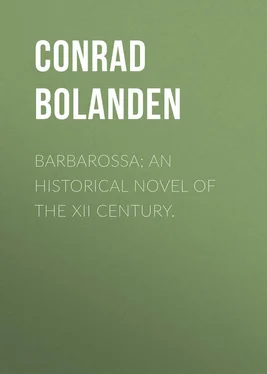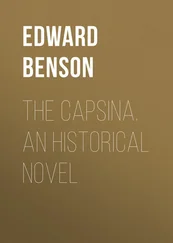Conrad Bolanden - Barbarossa; An Historical Novel of the XII Century.
Здесь есть возможность читать онлайн «Conrad Bolanden - Barbarossa; An Historical Novel of the XII Century.» — ознакомительный отрывок электронной книги совершенно бесплатно, а после прочтения отрывка купить полную версию. В некоторых случаях можно слушать аудио, скачать через торрент в формате fb2 и присутствует краткое содержание. Жанр: foreign_antique, foreign_prose, Историческая проза, на английском языке. Описание произведения, (предисловие) а так же отзывы посетителей доступны на портале библиотеки ЛибКат.
- Название:Barbarossa; An Historical Novel of the XII Century.
- Автор:
- Жанр:
- Год:неизвестен
- ISBN:нет данных
- Рейтинг книги:5 / 5. Голосов: 1
-
Избранное:Добавить в избранное
- Отзывы:
-
Ваша оценка:
- 100
- 1
- 2
- 3
- 4
- 5
Barbarossa; An Historical Novel of the XII Century.: краткое содержание, описание и аннотация
Предлагаем к чтению аннотацию, описание, краткое содержание или предисловие (зависит от того, что написал сам автор книги «Barbarossa; An Historical Novel of the XII Century.»). Если вы не нашли необходимую информацию о книге — напишите в комментариях, мы постараемся отыскать её.
Barbarossa; An Historical Novel of the XII Century. — читать онлайн ознакомительный отрывок
Ниже представлен текст книги, разбитый по страницам. Система сохранения места последней прочитанной страницы, позволяет с удобством читать онлайн бесплатно книгу «Barbarossa; An Historical Novel of the XII Century.», без необходимости каждый раз заново искать на чём Вы остановились. Поставьте закладку, и сможете в любой момент перейти на страницу, на которой закончили чтение.
Интервал:
Закладка:
The nobles were somewhat surprised at this exhibition of feeling on the part of their sovereign, but their satisfaction was evident. The Emperor continued, -
"We must not give any evidence of weakness, and as a punishment for the great interest which you have shown in favor of this culprit, you shall be banished, for a week's time, from our camp. This punishment will enable you to conduct to her home, the damsel whose cause you have so chivalrously advocated."
Emotion and fear at first did not allow Hermengarde to take in all the details of the scene. But when the youth came to tell her of her father's pardon, her joy and gratitude knew no bounds. Rising hurriedly, she would have thrown herself at the Emperor's feet, but he waved her away impatiently.
"You have no cause to thank me," he said. "Farewell, madam; this business has wearied us!" He signed to her to withdraw, and Conrad, Rechberg, and Hermengarde left the tent.
CHAPTER XI.
THE JOURNEY
Erwin thought it advisable to accompany Bonello and his daughter until they had reached a place of safety. Well aware of the dangers of the road, and the bitter party feeling throughout Lombardy, he feared lest the old man might lose his life, were he to meet any of the soldiers from Lodi, Pavia, Cremona, or the other cities which were leagued against Milan. He therefore procured a strong armed escort to protect his friends in case of attack. Whilst the Count of Rechberg was making his preparations, Hermengarde and the Abbot hastened to the castle to communicate the glad tidings of their success to the prisoner, who, in a transport of joyful emotion, threw himself upon his daughter's breast, with tears of pious gratitude. The Abbot looked on calmly. Pietro Nigri, as though he regretted that the tyrant had granted his old friend's pardon, gazed on in gloomy indifference. After the first moments of their joyful greeting, Guido requested to be informed of the details, and the Abbot Conrad related the scene which had taken place between the Emperor and the young Count.
"Where is the noble youth?" asked Bonello; "why did you not bring him here?"
At that moment was heard the clatter of horses' hoofs, and the clank of armor, in the castle-yard, and Erwin, hastily dismounting, made his way towards the tower. Bonello watched him anxiously; and when the Count, in brilliant armor, entered the room, he rushed towards him, seized his hand, and fell upon his knees.
"Most excellent young man!" he cried; "you are my preserver! may God reward you for your kindness to my child! Heaven grant me the power to prove to you my gratitude! Anything which you may ask of me shall be yours. May God bless and keep you."
The old man spoke in a voice choked with emotion. Erwin interrupted him, for he was pained to see Bonello at his feet.
"Rise, my lord, I beg of you. Your thanks overwhelm me. I have only acted as any other gentleman would have done, in my place. I merely crave the favor of accompanying you to your home."
At this new mark of kind consideration, Bonello was about to utter further words of gratitude; but the Count interrupted him by the announcement that all was ready for their departure. They left the tower, and entered the court-yard of the castle, where stood Hermengarde's palfry, and a splendid courser for her father. The parting between Bonello and the Abbot was touching; they embraced one another, and the prelate returned to the camp. Pietro Nigri mounted sullenly, glancing haughtily upon the young girl, and contemptuously at her father.
"Farewell, lady," he said; "I wish you every happiness. As to you, Sir," he added, "I sincerely trust that you may never have cause to regret the life which you owe to a tyrant's mercy, – a life destined to be passed unprofitably, for all that concerns the honor and well-being of your country."
He dashed off before Guido could reply, and the others hastened to leave the castle, where some of them, at least, had suffered so acutely.
At the foot of the hill, they struck towards the south, and then diverged from the main road. Erwin was anxious to please his guests, and readily yielded to Bonello's guidance. The latter was perfectly familiar with the country, and desired to avoid any meeting with the Italian soldiery. For, though firmly resolved never to draw his sword again, he was pained at the sight of so many Lombards hurrying to join Barbarossa's legions and attack Milan, the most important bulwark of Italian independence, so they took a cross road which speedily led them to the summit of the plain. Every precaution had been taken against the marauders who then infested the country. In front, rode two men-at-arms; then came Rechberg, followed by Hermengarde and her father, and four other troopers closed the rear of the escort.
"We must hasten," said Guido, "in order to arrive before nightfall at the monastery of San Pietro; it will be sufficient for the first day's journey, and by starting at dawn to-morrow, we shall reach my castle before the evening."
Erwin had wished to learn some of the particulars about Bonello's family, and he at once profited by the present opening.
"Only by to-morrow evening?" said he; "then your castle must be near the Lower Alps?"
"In their very midst, Count; in the very heart of the Alps," replied Guido. "If, as I suppose, you like mountain-castles, mine will please you. Years ago, when I visited Germany, I used to admire your fortresses perched upon the craggy peaks, like immense eagles' nests. The evident disposition of the Teutonic nobility to shun the cities and low grounds, and occupy the heights, is a mark of sound judgment. Our ancestors, also, knew how and where to build their strongholds. Did you ever see Castellamare?"
"Is that your dwelling?"
"Yes," answered Bonello. "The Romans from whom I am descended, erected the fortress, and it has been in my family from time immemorial."
"Doubtless, during your absence, your son commands in the castle?"
"I have no son," answered the old man, somewhat sadly.
"That pale-faced young man, who was with you at Cinola, is perhaps one of your relations?"
"Pietro Nigri? Oh, not precisely, but almost!" Here the young girl's horse plunged violently.
"Take care, my child; your horse seems inclined to be troublesome," said Guido. "Pietro," he resumed, "is the son of the Milanese Consul Nigri. He is a most worthy young man; he was my daughter's escort to Cinola."
They approached the monastery, around whose walls the twilight mist was slowly rising. Still, from afar, could be seen the dark red windows of stained glass; and the gilded cross upon the tower, illuminated with the rays of the setting sun, shone bright through the evening haze. Bonello gazed eagerly upon this glad haven of rest, as they hastened forward.
At the sound of the bell, a grating was drawn aside.
"Open, open, brother Ignatius!" cried the lord of Castellamare to the monk, who examined the appearance of the visitors. "We wish a lodging for the night, and a flask of your best wine."
Soon a key grated in the lock, the gates opened, and the little cavalcade rode into the court-yard.
"You are most welcome, my lord," said Ignatius, cordially; "pardon me if I have made you wait. We are obliged to be most prudent, for the country is filled with marauders, who have little respect for the sanctity of our poor cloisters. Your arrival here is truly gratifying to us all; but we regret our superior's absence."
"Where is he?"
"In Genoa."
"I am extremely sorry," said Guido; "for we might have talked together until matins."
The horses were led to the stables, and a lay brother conducted the travellers to the refectory. Several long benches and tables, two comfortable arm-chairs, a handsome crucifix upon the wall, and a bronze aspersorium , composed all the furniture of the room. Seating himself in one of the arm-chairs, Guido at once entered into conversation with the lay brother, whose mission it was not only to receive, but also to entertain all visitors to the convent.
Читать дальшеИнтервал:
Закладка:
Похожие книги на «Barbarossa; An Historical Novel of the XII Century.»
Представляем Вашему вниманию похожие книги на «Barbarossa; An Historical Novel of the XII Century.» списком для выбора. Мы отобрали схожую по названию и смыслу литературу в надежде предоставить читателям больше вариантов отыскать новые, интересные, ещё непрочитанные произведения.
Обсуждение, отзывы о книге «Barbarossa; An Historical Novel of the XII Century.» и просто собственные мнения читателей. Оставьте ваши комментарии, напишите, что Вы думаете о произведении, его смысле или главных героях. Укажите что конкретно понравилось, а что нет, и почему Вы так считаете.












